Part 2: Organisational health and capability
To ensure that we can achieve our outcomes, impacts, and outputs, we need a strong foundation of skilled people working together in a well-run organisation.
The organisation
The work of the Auditor-General is carried out by about 350 staff in two business units – the Office of the Auditor-General (OAG) and Audit New Zealand, supported by a shared team of corporate services staff – and by auditors contracted from about 60 private sector accounting firms.
The OAG carries out strategic planning, sets policy and standards, appoints auditors and oversees their performance, carries out performance audits, provides reports and advice to Parliament, and carries out inquiries and other special studies.
Audit New Zealand is the larger of the two business units. It carries out annual audits allocated by the Auditor-General, and operates from seven locations around the country. It also provides other assurance services to public entities within the Auditor-General’s mandate and in keeping with the Auditor-General’s auditing standard on the independence of auditors.
Figure 4 shows how all these parts fit together in our operating model.
Figure 4
Our operating model
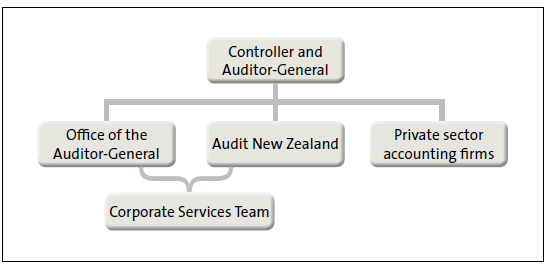
Our core expertise is in auditing and public governance and management. Underlying this expertise are our technical skills (for example, in accounting and auditing) and the exercise of our professional judgement. We are able to apply this by:
- listening to, and knowing about, the public entities we audit, our stakeholders, and the public sector so that we understand their expectations and the context for our work, and know the effect of our work; and
- building our individual and collective expertise, experience, and judgement so that we can strengthen our contribution to improving public sector performance.
Our people
After a period of employment stability during the global recession, we are beginning to experience higher turnover of staff and the return to an environment where our people and their skills are in high demand among domestic and overseas organisations. We will continue to work on our staff-retention activities, but also expect to increase recruitment of experienced staff from within New Zealand and overseas.
We use a number of indicators to measure the engagement, capability, and effectiveness of our people. Many of these indicators come from surveys of public entities we have audited and surveys of our staff. We aim to improve or at least maintain these results during the next three years. We summarise our measures and standards for organisational health and capability in Figure 5, and show details with our previous performance in Figure 6.

Figure 5
Summary of measures and standards for organisational health and capability
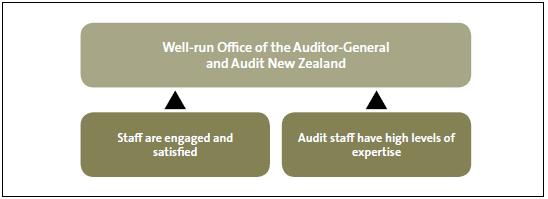
Figure 6
Measures and standards, and previous performance, for organisational health and capability
| Measures and standards | Previous performance |
|---|---|
| Staff are engaged and satisfied | 6.1 Gallup survey’s staff engagement scores in 2008, 2009, and 2010 |
| Improve (or at least maintain) the engagement and satisfaction of our staff measured against the previous two years. | 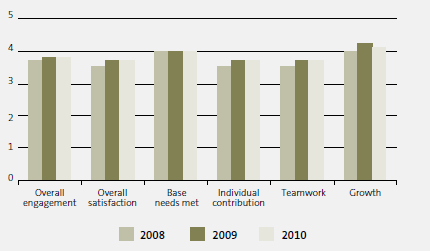 |
| Staff are engaged and satisfied | 6.2 Average number of years staff have been employed by the organisation in 2008, 2009, and 2010 |
| Improve (or at least maintain) the average number of years staff have been employed by the organisation as measured against the previous two years. | 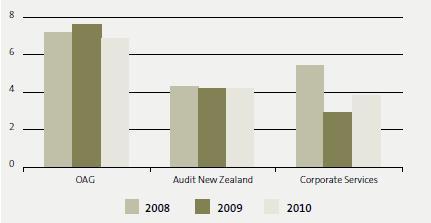 |
| Audit staff have high levels of expertise | 6.3 Percentage of staff passing NZICA accreditation exams in 2008, 2009, and 2010 |
| At least 95% of staff undertaking accreditation for the New Zealand Institute of Chartered Accountants (NZICA) pass their exams. | 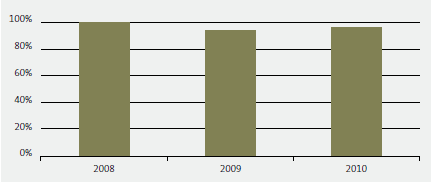 |
| Audit staff have high levels of expertise | 6.4 Percentage of auditors achieving a satisfactory or better grade from quality assurance review for the five years from 2006 to 2010 |
| Quality assurance reviews for all appointed auditors are completed during a three-year period. Of the auditors reviewed in any given year, 95% achieve a result of satisfactory or better. | 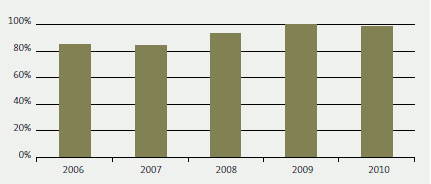 |
| 6.5 Audit staff have high levels of expertise: Listening, understanding, and exercising judgement | |
Client survey feedback shows that auditors’ knowledge about the business and operating context of public entities is improving, and that auditors are investing in work to understand that context. Our public entity clients give us improved (or at least maintained) ratings compared with the previous two years for how well their auditors:
|
|
| 6.6 Audit staff have high levels of expertise: Auditing performance information | |
| Our quality assurance reviews of our audit and assurance work confirms that auditors are carrying out their requirements for performance information in keeping with the Auditor-General’s Auditing Standards and our attestation that performance statements fairly reflect the achievements of the entity. This was a new measure in 2010/11. |
|
Equal employment opportunities
The Office’s programme for addressing equal employment opportunities is through its recruitment and employment policies. The principles of equal opportunity are embedded in the Office’s policies and procedures. In particular, our recruitment programme aims to attract and appoint the best people, who have the appropriate skills, values, and attributes to meet the Office’s needs, objectives, and strategic direction. We recruit in a manner that provides equal employment opportunity to Māori, women, ethnic or minority groups, and people with disabilities.
Recruitment and employment decisions and practices (such as feedback from exit interviews) are monitored to confirm application of policies. Managers are made aware of, and given support to fulfil, our good employer obligations through specific programmes and courses and one-on-one coaching.
Our staff profile shows a good level of diversity, which we expect to maintain during the next three years.
Business practices
We have an extensive quality assurance programme for all our outputs and services. This programme indicates an acceptable level of quality. Nevertheless, we continue to work on improving this.
Our internal audit function has, in the past, been contracted to an external firm with an annual internal audit programme agreed with our independent Audit and Risk Committee. We will review this internal audit arrangement for 2011/12 to ensure that it best meets the needs of the Office and the Audit and Risk Committee.
Facilities and equipment
In 2010/11, we made progress on addressing our long-term property needs, and have presented a business case for consideration by the Officers of Parliament Committee. We anticipate meeting our objective of co-locating our OAG and Audit New Zealand Wellington staff by 2013.
We rely on information technology to complete our work. To ensure an effective, efficient, and customer-focused service, our audit staff working in the field use specialist auditing and remote access and communications tools. In the OAG, the audit status database system is used to manage the allocation, tracking, and reporting of audits. We plan to maintain and enhance these systems during the next three years.
page top